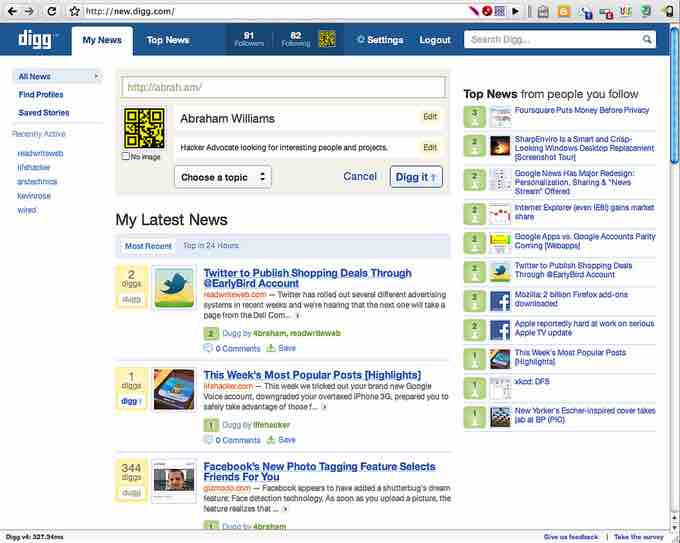Research using Digital Media
The field of Internet research is relatively new and evolving. Online research methods enable researchers to use increasingly sophisticated digital tools to collect data via the Internet. Thus, the practice is also referred to as Internet research, Internet science, or iScience. Many of these online research methods are related to existing research methodologies, but re-invent and re-think them within the scope of digital technologies, rules and media associated with the internet. The growth and rapid adoption of social media technologies has introduced a new level of complexity and opportunity for digital researchers. Inclusion of social media research can provide particularly unique insights into consumer and societal segments.

Digg Website
Social bookmarking sites such as Digg are used to gather research on different target markets.
Application of Digital Media in Research
Digital media including images, videos and audio can prove valuable sources for Internet researchers. Specific types of research methods that incorporate digital media include:
- Online ethnography
- Online focus groups
- Online interviews
- Online questionnaires
- Web-based experiments
- Online clinical trials
Advantages of Digital Research
Market research is increasingly making use of developments in Web 2.0 technologies and online communities. Social media analytics allow brands to efficiently collect and analyze qualitative research on user interaction with images, video, podcasts and other digital media. Although the open and collaborative nature of content communities offer opportunities for research, companies also utilize private online communities focused on individual brands or customer segments. These private communities can engage customer groups or target consumers who might be difficult to reach using traditional offline tactics. Companies are able to collect and aggregate this consumer information to define segments of homogeneous consumers. To supply targeted and relevant product offerings, the data is further segmented using in-house or third-party databases; personalization techniques; or opt-ins from consumers themselves.
Brands also benefit from online communities by having them on-hand to respond to questions, test hypotheses and observe trials in real-time. Digital technologies can quickly adapt to an organization's research needs, while keeping pace with internal development processes. Social media and digital platforms also produce a consumer feedback loop where brands can continually check new ideas, such as product development, from inception to launch.